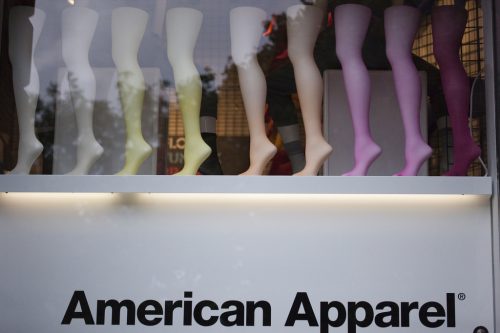American Apparel, a clothing brand known for its bold advertising and hipster clothes, has been sold to Gildan Activewear of Canada. The brand, created in the early 1990s, filed for bankruptcy protection and has laid off 2,400 employees, according to USA Today.
Though Gildan Activewear did buy the company, it does not intend to continue running the stores. The 110 stores in the United States will close, but not before running large sales. Gildan Activewear is “a manufacturer of blank t-shirts, sports shirts and fleece products,” according to their website. They sell their products “to wholesale distributors who then sell them to various resellers who perform screen printing, embroidery, garment and tie-dying processes.”
“When a buyout involves two companies, the company being bought possess something that the buyer sees as desirable,” Patrick Murphy, a professor in the Department of Management and Entrepreneurship at DePaul University said. “The transaction also includes taking the purchased company’s debts.”
The American Apparel located closest to DePaul’s Lincoln Park campus is just a mere mile away, located at 929 W Belmont Ave. And for those in the Loop, the store is only blocks away, located at 39 S State St.
“We are closing,” confirmed one of the managers at the Belmont American Apparel who doesn’t want to provide her name. “It’ll be at the end of April. We’re definitely informed about what’s going on.”
Belmont’s American Apparel is boasting a 40 percent sale, as well as sales online and at other stores. The sale is an attempt to get rid of inventory before the stores close.
“American Apparel was my go-to place for body suits and fun basics for concerts and costumes,” Paige Hartkoorn, a DePaul student said, who has been shopping at American Apparel since seventh grade.

“I am surprised they are completely closing,” said Hartkoorn. “I do know in the past American Apparel has had some controversy about sexual issues with conduct, but not as much financially.”
American Apparel has had its fair share of issues and controversies. The company has been accused of sexual harassment,sexualization of models and complaints in the workplace. In 2011, a worker was crushed in a knitting machine and killed.
Jordan Strand, a shopper at American Apparel since his sophomore year, is not shocked by the closing.
“I’m not really surprised, they’ve come under a lot of fire for their absurd sizes,” Strand said. “Plus, their clothes are so overpriced yet so low quality.”
“Honestly, I’ve never found it cool that they appeal to only one body type of women,” Strand said.
Maggie Carson, on the other hand, thinks the decline of American Apparel is due to a change in culture within teenagers.
“I think American Apparel was cool when Lana Del Ray and Marina and the Diamonds were cool,” Carson said. “The whole hipster phase switched over intoEDM and rave culture that wear rave clothes.”
“The other group that split off is the more of a hipster group that doesn’t shop there because of the price,” Carson said. “People wanted to be more unique.”
“The fashion and clothing industries are very tough environments, a strong brand is a powerful asset,” said Murphy. “Inthis case, the operations of the company are closing, and the company had already incurred bankruptcy in 2015, but the brand is very well known and still quite strong. That’s a valuable asset.”
Many students aren’t incredibly phased by the company’s collapse, as they simply plan to just move on to new stores.
“Instead of American Apparel for bodysuits I’ll shop at Brandy Melville, Nordstrom and Urban Outfitters,”Hartkoorn said. “For fun basic pieces I will look online for neon leggings or crop tops.”
“I usually shop at Urban Outfitters,Target, Forever 21, (and other) places like that,” said Strand.
American Apparel is not the only store closing. The Limited filed for bankruptcy last week too, while Sears and Walmart are both downsizing.
Amazon shares have been increasing in value, while other big-name retailers such as Kohl’s have fallen dramatically.
This decline of in-store retail, shown by the closing of American Apparel, shows the further progression into online shopping. With the industry forever changing as technology continues to play such a large role in the retail industry, many stores and companies have failed to find a way to adapt to this new business world.
“Large retail stores in general are part of a slowly shrinking industry,” Murphy said. “Obviously, technology and online shopping are a threat to this industry.
Companies like Sears, which was the ‘Amazon.com’ of the mid-20th century, now face an environment that is hostile to their business model.”
“Traditional retail stores will have to innovate and adapt in order to perform,” said Murphy. “For example, Target — one of the most innovative retail companies in this traditional space — is facing challenges.”
“Radically unique approaches, such as Amazon Go, are going to become more common as a means to compete and thrive,” Murphy said. “In addition, a very strong brand that drives customer loyalty is a very powerful asset.”
“I would not expect American Apparel to disappear; you’ll see the name and logo again because it is a strong brand.”

